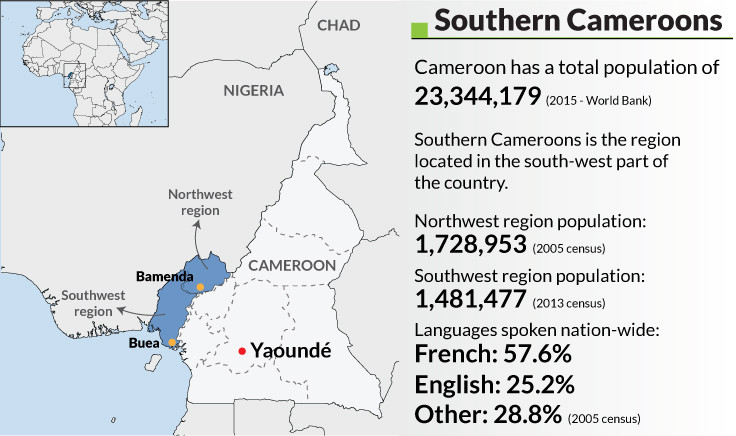Protesters try storm Cameroon embassy in London as anger over 'Anglophone problem' mounts
Protesters supposed to attend meeting to discuss ongoing unrest in Cameroon's English speaking areas.
Dozens of people took part in a protest outside the High Commission of Cameroon in London on Sunday (13th August). Police officers had to intervene to prevent some individuals from storming the building.
Demonstrators chanted slogans in reference to the ongoing unrest in the English parts of Cameroon, the Southwest and Northwest provinces, where anti-government protests and strikes have been occurring for months.
French and English are the official languages of Cameroon. Lawyers, teachers and students have been striking since October 2016 against perceived marginalisation, the use of French in courts and schools in the provinces, and the lack of English versions of some legal acts and codes.
Amid the ongoing unrest, some groups have taken to the streets demanding a return to a federal state system, the breakaway of the Northwest and Southwest provinces and the restoration of Southern Cameroons, also known as the Republic of Ambazonia, a British mandate during colonisation.
After months of rallies, President Paul Biya instructed a ministerial delegation to travel to London and engage with Cameroonian expats to discuss the ongoing situation in the country.
A meeting scheduled to take place on Sunday, was later cancelled "due to unforeseen circumstances."
Bernard Konfor, President of the Southern Cameroons Community UK (SCCUK), told IBTimes UK that members of the group, who were supposed to attend the meeting, had not been made aware of the changes.
"The police told us that according to their office, they had received a message that the meeting was postponed to a later date, but we saw people inside [the embassy], some took pictures and then closed the curtains," he explained.
"We decided to go in, but we had a scuffle with the police. We opened the door and got inside but they called for reinforcement and then they pushed us outside, so we staged a demonstration and delivered speeches."
The Cameroon high Commission has not replied to a request for comment.
Konfor said protesters aimed to raise awareness on alleged marginalisation and abuses occurring in Southern Cameroons. "Our message was that the Commonwealth should suspend Cameroon because things are not going right in the country," he said. "We don't want the same genocide occurred in Rwanda to occur in our country as well."
Cameroonian authorities have been accused of using excessive force to quell rallies, amid claims some protesters were killed. The government has denied the allegations and rejected calls for a referendum on federalism.
The government stirred criticism after it implemented an internet ban – which was later lifted – in its English speaking zones, forcing people to travel to French-speaking regions where they can use the internet.
The move prompted the UN and rights groups to call on the governement to restore internet service.
Earlier this year, the Foreign and Commonwealth Office (FCO) told IBTimes UK it was closely monitoring the situation in the English-speaking region and called for an end to the violence.
"The 'Anglophone crisis' has morphed into an unstructured, cells-based disorganised movement, with hundreds of independent groups and leaders in and outside Cameroon claiming legitimacy of one objective to another," security analyst and counter-terrorism expert David Otto told IBTimes UK.
"The crisis has reached a point where a third party state or trusted NGO has to officially intervene to protect the integrity of Cameroon and the stability of the region by initiating a dialogue process outside Cameroon," he said.
"It is Cameroonians, both - using the colonial title - Anglophones and Francophones who are paying the ultimate price."
What is 'Southern Cameroons'?

Southern Cameroons was the southern part of the British Mandate territory of Cameroons during colonisation.
In 1961, people of Southern Cameroons voted whether to join Nigeria or the Republic of Cameroon, which had already obtained independence from Britain and France one year earlier.
The vote resulted in Southern Cameroons becoming part of the French speaking Republic of Cameroon.
In 1972, a new constitution was adopted in Cameroon, replacing the federal state with a unitary state.
"Gradually they forged us into a unitary state and we have become marginalised, we have been subjected to poverty and all forms of humiliation," Comfort Konfor, SCCUK public relations officer, told IBTimes UK.
"The majority of resources come from English speaking areas of the country, but we don't enjoy it, being an English-speaking Cameroonian is a curse, we have no voice, we are second-class citizens"
Some groups in English Cameroon originally sought a return to a federal system, but eventually started calling for independence.
© Copyright IBTimes 2025. All rights reserved.






















